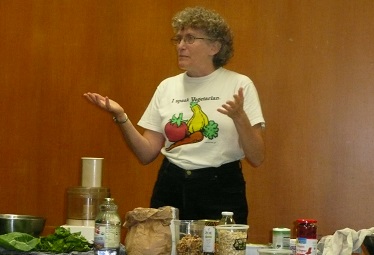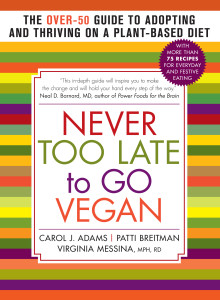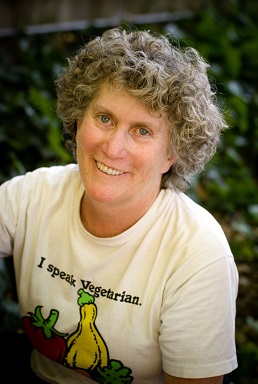A Truer Book Title Has Not Been Written
The over-50 crowd now has their own book on ditching animal foods. Never Too Late to Go Vegan is a comprehensive guide to adopting and staying on a plant-based diet for this age group.
The book covers all the “whys” of making this change, as well as what to eat, how to cook it, and how to stay the course while dealing with some social and logistical challenges that vegans may run into. Lists of tips cover everything from how to make the transition to a plant-based diet to taming stress to places to learn more. Stories from the three coauthors, Patti Breitman, Carol Adams, and Ginny Messina, bring the lessons alive, as do many other entertaining and inspiring stories from others who went vegan in the second half of life.
I was happy to have a chance to talk with Patti Breitman, who is now a neighbor. Coincidentally, when I lived in Marin County in the 1990s, I regularly attended potlucks held by Patti’s organization Marin Vegetarian Education Group. These gatherings were an important force leading to my own dietary change from being vegetarian to pressing “delete” on dairy and eggs in my life.
I asked Patti about the process of writing the book. Here’s what happened. She and Carol Adams had been planning to collaborate on a book called What Do Vegans Eat. So many excellent vegan cookbooks were becoming available, though, that she and Carol lost interest in the project and dropped it.
Carol suggested a book for the over-50 demographic, and both got excited and invited Ginny to
join the project. All three authors contributed to the book roughly equally, although each with a somewhat different specialty, reviewing each other’s work and planning what the book should cover. The book took a year to complete.
Patti shared the main goal of the book. “We want to reassure people that it’s not as hard as they think to become vegan. If you think it’s really hard, it’s because you have never tried it. Yes, there are a few weeks or months of learning. Those are a hump to get over. But I have not met anyone who regrets making this transition – no one regrets it. Also, we wanted to share that it’s okay to move one step at a time in the direction of becoming plant-based. You don’t have to do it all at once. For example, start with being vegan one day a week. This will inspire you to think about what you are eating and find new recipes, buy different foods. Once you get comfortable with this, it’s natural and easy to add another day of the week to your vegan calendar, and maybe even grow from there. Being vegan is so rewarding that it doesn’t matter where you start. It should not be intimidating. You should know that it’s not that hard to veganize your favorite recipes so you don’t have to

Patti give a talk and food demo. Her work educating others of the benefits of eating plant-based had an important influence on my own life
drastically change your tastes.”
I love Patti’s vision of the plant-based community. “I see the vegan community as a huge, open-sided tent. Everyone in the tent is saving lives and better off than they were outside the tent. The most important thing is that you enter the tent, and from any angle is okay to do this. Once you are in the tent, you can see which corner you gravitate to. Maybe you will go to the whole foods, plant-based part of the tent, or the no salt part, or the raw or macrobiotic part. Maybe you will still eat plant-based junk foods, even if you know this is not ideal. The tent is inclusive, and everyone is welcome in it.”
I asked Patti what questions she gets from readers. “The most common is “what should I do first.” My response is to stop eating dairy. That is the biggest bang for a part-way change in diet, and it’s not so hard to do any more. We have lots of tips about this in our book.”
Patti shared her own path to a plant-base diet. She grew up in Manhattan and then Long Island, eating a typical American diet of meatloaf, lamb chops, chicken, and pot roast. She was not a good eater, and had to be forced to finish her food. She also hated cooking, and when she lived in New York as a young adult, relied on restaurants for food. She let me know “I loved to prepare food after I became vegetarian. It never occurred to me that touching food could be fun. Cutting up vegetables is a true pleasure. However, I still don’t like to spend much time cooking, and gravitate to raw food in the summer. Soup is my favorite food year-round though. It’s easy to make. Just keep lots of veggies in the house, and throw them all in a pot with various spices that make the soup taste different every time you make it.”
Patti, who worked in the publishing business most of her career, became vegetarian after
editing the book Fit for Life. “I was amazed to lose 18 pounds in the six months after I changed my diet. I hadn’t been sick, but it was the first time I knew what it felt like to be well and energized. I had so much energy that I entered the New York City Marathon. Also, my nails stopped breaking and my pimples went away. After I moved to California, I read John Robbins’ Diet for a New America. He is so compassionate to both people and animals that he inspired me to want to be just like him. I went vegan overnight.”
Patti and her coauthors are up against the current idea that is kind to eat “humanely raised animals.” This fallacy ignores the health and environmental consequences of eating meat, while cultivating the idea that treating animals a tiny bit better is good enough. Patti observed “We are still killing male chicks at the hatchery. It doesn’t make a difference if their sisters are treated a tiny bit better. They still lead awful lives with early and painful deaths.”
If you want to make a choice that will transform your life for the better, if you want to step into the vegan tent and see what it’s all about, Never Too Late to Go Vegan is an excellent guide. All the inspiring stories and useful tips will have you eating one vegan meal after another – and loving it.
If you enjoyed this post, you may want to learn about why plants are the base of the food chain, so that even so-called “humane meat” is unnecessary and un healthy.
Intrigued? Now you can use our Whole Foods Blog Finder to target informative, fun postings on whole foods, plant-based diets. Quick information at no cost!
Blog posting by Janice Stanger, Ph.D. Janice authored The Perfect Formula Diet: How to Lose Weight and Get Healthy Now With Six Kinds of Whole Foods, a book that shows you how to thrive on a whole foods, plant-based diet. Janice is pleased to be part of the community in the vegan tent.
Tags: Carol Adams, getting healthy, Ginny Messina, lose weight, making a difference now, Never Too Late to Go Vegan, Patti Breitman, Plant-based nutrition, vegetables, whole foods plant-based diet







